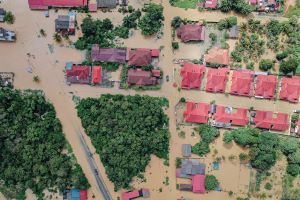Auto insurance is required in most states, but it’...
 Unlike homeowners or commercial property insurance that protects property owners against multiple perils, flood insurance protects against a single peril – flooding.
Unlike homeowners or commercial property insurance that protects property owners against multiple perils, flood insurance protects against a single peril – flooding.
Water can enter a building in various ways, and damage by flooding is a particular type of water damage. Water that enters a building from any source can cause a lot of damage in a short period.
While insurance coverage is available, it works differently than residential property insurance. We’ll explain what flood insurance is, why you may need it, and what it does and doesn’t cover.
A simple definition of flooding is an overflow of water over land that’s normally dry. Flooding is a temporary situation where water inundates two or more acres of land or two or more properties. Essentially, flooding is water that enters buildings from the surface of the ground as opposed to a leaky pipe or water that backs up through sewers or drains.
Flood insurance is available through the National Flood Insurance Program (NFIP) which was created as part of the National Flood Insurance Act of 1973. The goal of the program is to reduce future flooding and help protect property owners. Flood insurance is available for residential and commercial properties.
Communities must be designated a federal disaster area before property owners in that area can purchase flood insurance. The NFIP establishes flood zones based on flood maps that determine how susceptible an area is to a flood.
Depending on the property, property owners may need or want to purchase flood insurance. Property owners who have a government-backed mortgage must purchase flood insurance if the property is located in a flood zone.
Where mortgage lenders don’t require flood insurance, property owners may opt to purchase it to give them peace of mind. The following statistics may motivate a property owner to purchase flood insurance:
Property owners who are interested in purchasing flood insurance should understand what flood insurance includes and excludes as well as other nuances about this type of coverage.
Flood insurance has two basic coverages – coverage for the structure and coverage for the contents. There are separate deductibles for the structure and contents, and the claims are separate.
Building coverage includes the following items:
Contents coverage includes the following items:
The structure may be covered for replacement costs or actual cash value. Contents are always covered for actual cash value.
Commercial properties are eligible for up to $500,000 of coverage on buildings and $500,000 on contents. Residential property owners can get up to $250,000 on the building and $100,000 for contents.
Flood insurance carries exclusions just as other types of insurance policies do. Flood insurance doesn’t cover the following:
Flood insurance policyholders should be sure to review all exclusions and conditions as listed in the policy.
While flood insurance coverage comes from the federal government, only licensed insurance agents may sell it. In recent years, private insurance companies have been allowed to sell flood insurance, as long as policies provide the same coverage the NFIP covers at a minimum.
Most flood insurance applicants must wait 30 days before flood coverage goes into effect, although there are exceptions. Property owners may purchase a limited amount of flood insurance if the community is in the initial phase of participating in the NFIP. Also, new property owners may get flood coverage when they take out a mortgage on a property that requires flood insurance.
To get more answers to how flood insurance can protect your home, contact one of our licensed agents at Leap Carpenter Kemps Insurance Agency at 209-384-0727.
Auto insurance is required in most states, but it’...
No matter where you plan to travel, purchasing a t...
The majority of millennials are facing big debts, ...
Leap | Carpenter | Kemps Insurance Agency provides Commercial Business Insurance, Employee Benefits, Life and Health Insurance, and Personal Insurance to all of California, including Merced, Atwater, Los Banos, Mariposa, Madera, Fresno, Modesto, Turlock, and Stockton.
CA License Number 0646081 | Licensed to do business in California, Arizona, Hawaii, Idaho, Montana, Nevada, North Carolina, Oklahoma, Oregon, Virginia, West Virginia and Washington.
© Copyright 2023 Leap | Carpenter | Kemps Insurance Agency — Privacy Policy | Terms & Conditions.
Merced Office
3187 Collins Drive
Merced, CA 95348
Phone: (209) 384-0727
Additional Contacts
Toll Free: (800) 221-0864
Fax: (209) 384-0401